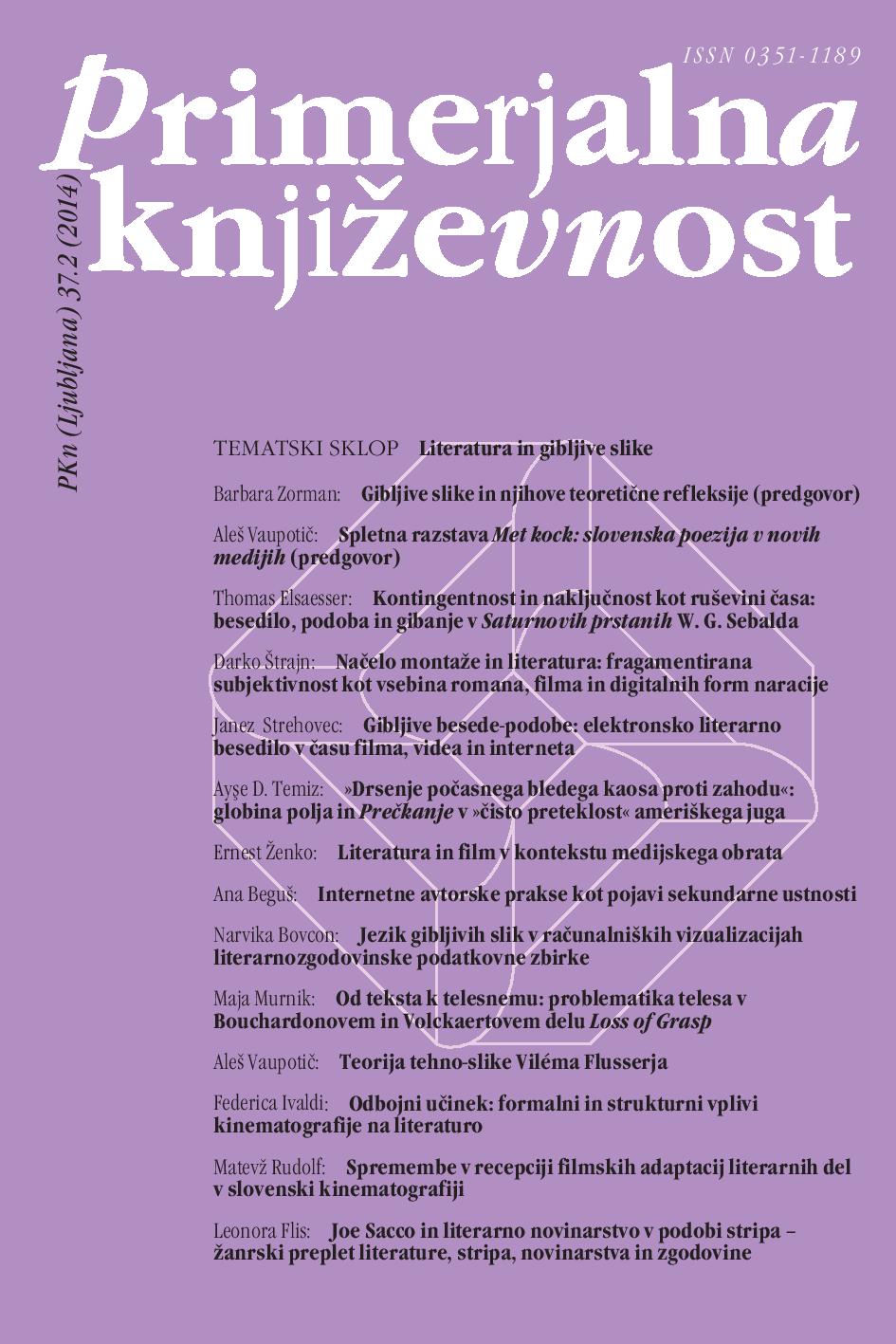Changes in the Reception of Literary Film Adaptations in Slovene Cinema
Keywords:
literature and film, Slovene cinema, Slovene literature, film adaptationsAbstract
The article examines how film and literary critics evaluated the relationship between literature and film in Slovene cinema. Although Slovene cinematography reached some of its peaks with the help of Slovene literature, film adaptations of Slovene literary works were in the past subdued to several polemics for different reasons. In the period before the independence of Slovenia, the reception of literary film adaptations was affected by the fact that more than 41% of feature films were based on literary works. Due to such vast quantity, Slovene film was often unappreciated compared to literature. Moreover, literature – in the first stages of Slovene cinematography – was used as a channel to convey ideology of the time to film because it was easier to control film production when based on literature. The amount of film adaptations declined rapidly (to 20%) after the independence of Slovenia (1991) but on the other side the interest for adaptations surprisingly gained in the last decade. The Dudley Andrew’s thesis, that the method in which literary works are selected and adapted to the film medium is useful indicator of the historical and social changes of certain national cinema, are very much exact for Slovenian cinematography. Before independence, there was impression among film critics that the Slovene film adaptations are thematically strongly ideologically related to the Second World War. After 1991, film directors therefore understandably tried to avoid screenplays that were based on literary works. After a strong rejection of film adaptations in 1990s, the situation normalized in the last decade – film adaptations are intensely gaining autonomy especially in wider media space, particularly after Marko Naberšnik’s film Rooster’s Breakfast (2007) based on the novel by Feri Lainšček. Significant difference is that after 1991, film directors and producers made their own choices which novels will they adapt (based on personal, economic, aesthetic etc. reasons). In addition, it is all too often that contemporary Slovene films, based on original screenplays, encounter problems of (not) taking into consideration basic principles of Aristotle’s Poetics.References
Andrew, Dudley. “Adaptation.” Film Adaptation. Ur. James Naremore. New Brunswick, New Jersey: Rutgers University Press, 2000. 28–37.
Furlan, Silvan in Kozole, Damjan. »Boštjan Hladnik: Živim, ko snemam.« Ekran 16.8 (1991): 22–23.
Furlan, Silvan. »Kratka predstavitev slovenskega celovečernega filma.« Filmografija slovenskih celovečernih filmov 1931–1991. Ur. Silvan Furlan. Ljubljana: Slovenski gledališki in filmski muzej, 1994. 9–19.
Kolšek, Peter. »Film: Čefurji raus! « Delo (5. 10. 2013): 19.
− − −. »Zajtrk za vse.« Delo (19. 10. 2007): 23.
Ljubić, Milan. »V znamenju Doktorja.« Ekran 22.3–4 (1985): 71–72.
Milovanovič Jarh, Peter. »Živela svoboda.« Ekran 25.2 (1988): 37.
Rožanc, Marjan. »Filma še nimamo.« 40 udarcev: slovenska filmska publicistika o slovenskem in jugoslovanskem filmu v obdobju 1949–1988. Ur. Zdenko Vrdlovec. Ljubljana: Slovenski gledališki in filmski muzej, 1988. 172–173.
− − −. »Scenaristika danes.« Ekran 24.5–6 (1987): 31–32.
Rudolf, Matevž. Ko beseda podoba najde: slovenska literatura in film v teoriji in praksi (1984–2012). Ljubljana: UMco in Slovenska kinoteka, 2013.
Rugelj, Samo. »Slovenska literatura in film: primer Feri Lainšček.« Pogledi (16. 6. 2010): 7.
Stankovič, Peter. Rdeči trakovi: reprezentacija v slovenskem partizanskem filmu. Ljubljana: Fakulteta za družbene vede, 2005.
Šimenc, Stanko. Panorama slovenskega filma. Ljubljana: DZS, 1996.
− − −. Slovensko slovstvo v filmu. Ljubljana: Mestno gledališče ljubljansko, 1983.
Valetič, Žiga. »Scenaristika: hobi ali poklic?« Pogledi (13. 11. 2013): 14–15.
Vrbnjak, Eva. »Čefurji raus!« Bukla (2008). Splet. 23. 8. 2013. http://www.bukla.si/?action=knjige&book_id=1043.
Vrdlovec, Zdenko. »Knjiga in kino.« Literatura 14.127–128 (2002): 81–95.
− − −. »Ne dobri ne slabi – čefurji.« Dnevnik (6. 9. 2013): 19.
Zorman, Barbara. Sence besede: filmske priredbe slovenske literature (1948–1979). Koper: Založba Annales, 2009.
Zupan Sosič, Alojzija. »Petelinji zajtrk, knjižna in filmska uspešnica«. Seminar slovenskega jezika, literature in kulture. Ljubljana: Center za slovenščino kot drugi/tuji jezik pri Oddelku za slovenistiko Filozofske fakultete, 2008. 87–96.


